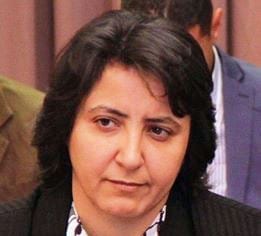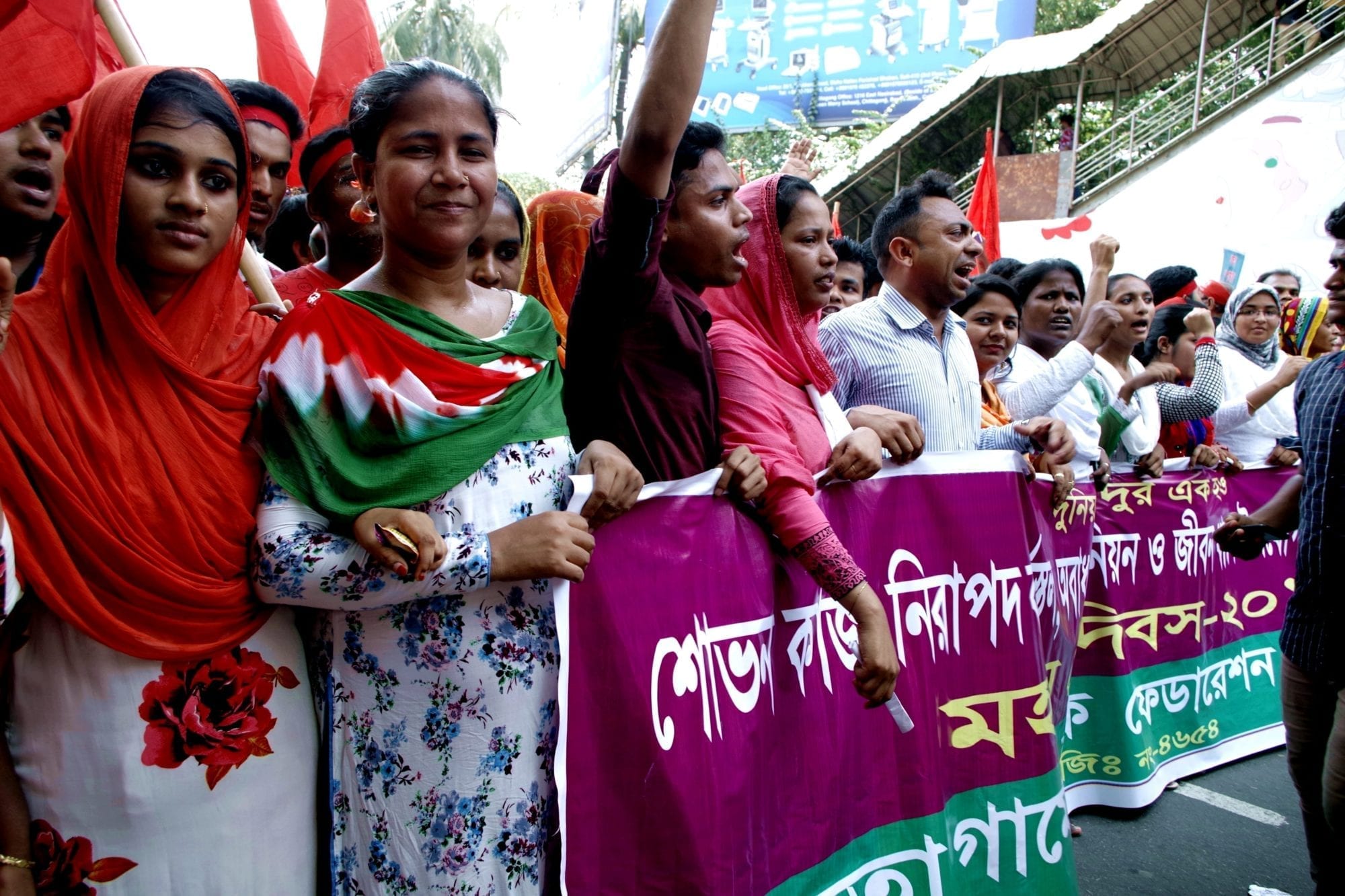
Jan 6, 2017
In mid-December, a strike in Ashulia, an industrial suburb of Bangladesh’s capital, Dhaka, and a ready-made garment sector hub, quickly snowballed into widespread unrest. Garment workers abandoned their factories to call for a living wage in response to ever-rising costs. Mass arrests and firings ensued.
The minimum wage for a Bangladeshi garment worker is $68 a month, an amount last fixed in 2013. When they took to the streets in December, workers were demanding the minimum be increased to $191 a month. Dhaka is the 71st costliest city in the world, in line with Montreal, Canada.
The strike started in Windy Apparels and rapidly spread to other units resulting in 60 factories suspending operations. On December 20, the Bangladesh Garment Manufacturers and Exporters Association (BGMEA) ordered owners to reopen factories and resume operations after a five-day break. However, upon their return, more than 1,600 workers were notified that they had been laid off due to their alleged involvement in the unrest. Labor leaders and activists collectively demanded the reinstatement of all workers but received no response.
Windy Apparels is the same factory that denied a worker sick leave in October despite a very serious illness. She collapsed on the factory floor and died upon reaching the hospital. Her body was left at the factory gate for her husband to retrieve.
Since the factories reopened, union leaders and worker rights advocates have been detained or arrested on charges related to their alleged involvement in the strike. Union activists from different federations and from different areas of Dhaka—and unrelated to the Ashulia unrest—also have been swept up by police. Many have been charged under the Special Powers Act, 1974, which provides police with sweeping power to detain individuals. The act has been used to suppress political opposition and peaceful demonstrations, as well as to retaliate against individuals engaged in personal disputes with people in positions of authority.
Journalists and nongovernmental organizations that focus on worker rights are also being targeted and intimidated by security services. Ekushey Television Journalist Nazmul Huda, was arrested on December 23 and held in police custody for two days−during which time he was allegedly tortured−on charges of inaccurate reporting on the strike.
Last week, police arrived at a community center operated by the Bangladesh Center for Workers Solidarity, an ally of the Solidarity Center, and ordered its closure.
As a result of this and the arrests of union leaders who had no role in the unrest, a chilling effect has taken hold with some other union federations closing offices even though they have not been ordered to.
International worker rights organizations, including the Solidarity Center, are monitoring the situation, and the Solidarity Center continues to track the registration of garment-sector unions in the country.
Donate now!
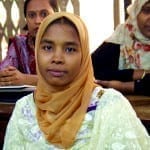
Your tax-deductible contribution to the Bangladesh Worker Rights Defense Fund will support Bangladesh garment organizers and worker-activists as they help workers who toil in unsafe factories for unfair—or unpaid—wages and who, without a union, cannot exercise their rights.
Activities your donation may support include:
• Medical care following an attack
• Safe spaces for organizers and their families who must go into hiding
• Legal assistance
• Transportation
• Awareness-raising activities regarding attacks on worker rights
• Replacement of belongings stolen during assaults
Your receipt for supporting Bangladesh organizers and activists will indicate The Solidarity Center Education Fund. The Fund is a tax-exempt charitable organization under section 501(c)(3) of the Internal Revenue Code. Your contribution is tax deductible to the extent allowed by governing laws. In addition, pursuant to the Internal Revenue Code requirement stated in Internal Revenue Service publication 1771, no goods or services were provided in return for this contribution.
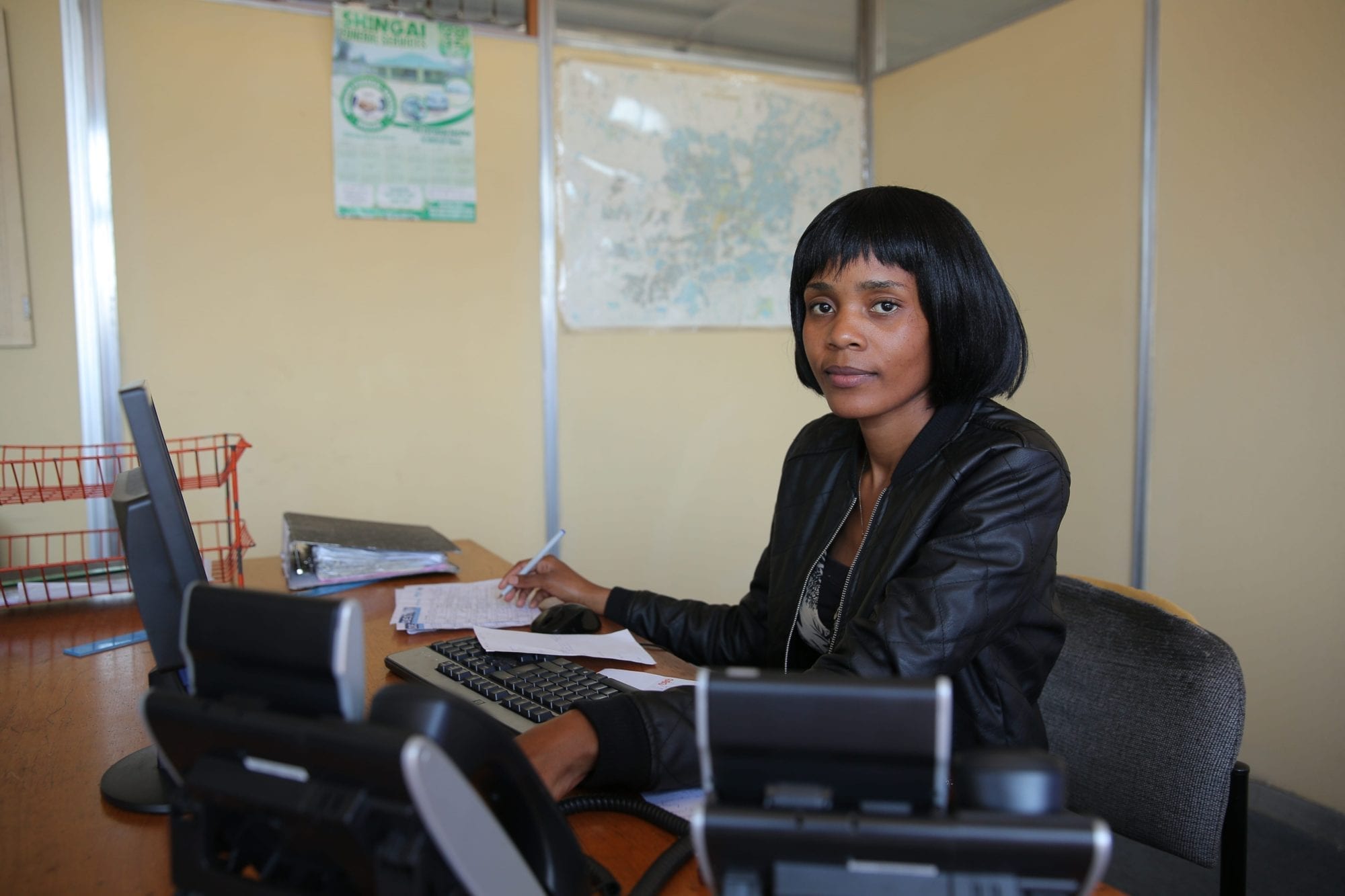
Dec 20, 2016
Workers around the world are losing ground in their paychecks as annual growth in real wages around the world fell to 1.7 percent in 2015, down from 2.5 percent in 2012, according to a new International Labor Organization (ILO) report.
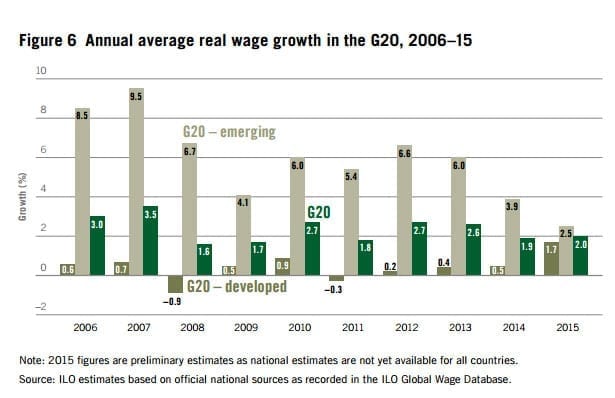
Credit: ILO
Wages have stagnated primarily in developing and emerging economies, especially in Latin America and Eastern Europe, according to the Global Wage Report 2016/17.
Among developing countries—including China, India, Brazil, Nigeria and many other rapidly growing economies—real wage growth in 2012 was around 6.6 percent, but by 2015 it had fallen to just 2.5 percent. Growth in developing countries had fueled economic recovery after the 2008 recession.
Meanwhile, wages in developed countries rose between 2012 and 2015—from 0.2 percent in the wake of the financial crisis, to a 10-year high of 1.7 percent. This uptick does not compensate for slowing wage growth in developing countries, yielding a net decrease worldwide.
To create sustainable wage growth, the ILO calls on countries to enact policy reforms that will benefit working people, such as raising minimum wages and increasing workers’ access to collective bargaining, particularly in global supply chains. The ILO also calls for coordination at the global level to boost wages, reduce inequality and protect working people’s right to freedom of association.
Productivity Outpaces Wages, Workers Miss Out
In the majority of countries, “wage growth in recent decades has lagged behind the growth of labor productivity,” according to the report. This means that even as major economic sectors like agriculture and construction have become more prosperous, workers are getting a smaller and smaller share of that prosperity.
The ILO attributes this divide to the weakening of labor market institutions and pressure from financial markets to direct company profits toward investors rather than workers. As a result, the ILO report says stagnating wages in developing countries are part of a slow but steady decline in working people’s share of wealth in the global economy.
Women have been especially hard hit, earning between 10 percent and 40 percent less than men in hourly wages in many countries. In Azerbaijan and Benin, the gender gap was the highest at nearly 45 percent. Many women work in low-paid, precarious jobs and although they contribute 66 percent of the world’s work, they earn 10 percent of income.
Crucially, the report highlights the frequent correlation between greater wage inequality, greater household income inequality and the declining number of jobs.
Read the full report.
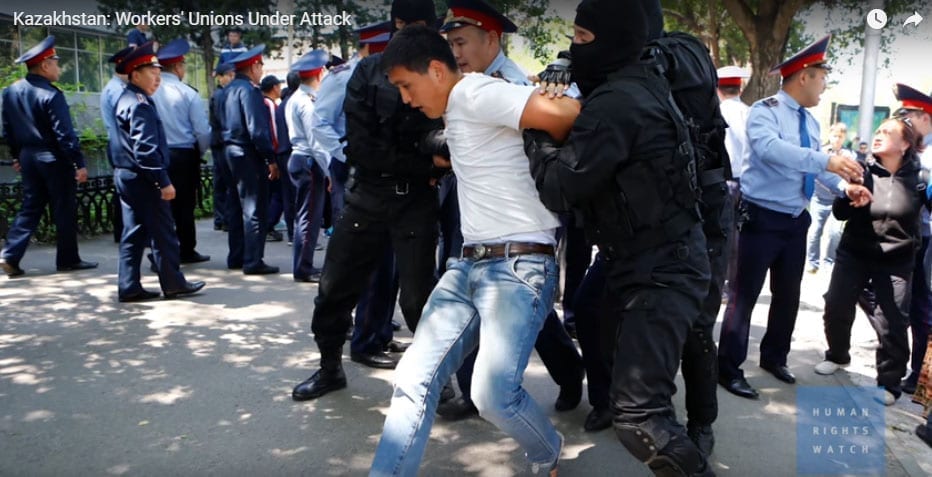
Dec 16, 2016
Union leaders tell the Solidarity Center that the Kazakhstan government has launched a campaign to intimidate union members and to malign and discredit the Confederation of Independent Trade Unions (CFTUK). In addition, the regime has initiated legal action to liquidate the confederation, while leaving intact a government-aligned federation.
Yet even in the face of threats and danger, union leaders and workers say they vow to hold protests if the CFTUK is dissolved.
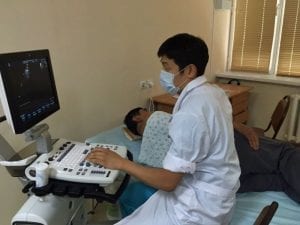
The Kazakhstan government is seeking to dissolve unions of health care workers and others. Credit: Kazinform
The Kazakhstan Ministry of Justice brought a legal challenge before the country’s Economic Court calling for revocation of CNTUK’s registration and its affiliated unions representing health and domestic workers—essentially making union activity illegal.
In a letter, the International Trade Union Confederation (ITUC) denounced the government’s failure to guarantee the right to freedom of association and called on it to withdraw the request before the Economic Court.
A new report also shows Kazakhstan’s new trade union law, adopted after strikes in 2011, has made it more difficult to organize independent unions in the country. “Changes to the labor and criminal codes have contributed to an environment hostile to worker activism,” according to Human Rights Watch, which released the report.
“‘We Are Not The Enemy’: Violations of Workers’ Rights in Kazakhstan” is based on interviews with more than 50 trade union leaders, labor activists and workers across Kazakhstan, and describes harassment, surveillance and, in some cases, spurious legal prosecution or dismissals in apparent retaliation for labor activism.
The International Labor Organization has examined the government’s failure to guarantee the right to freedom of association and in 2015 and again this year urged it to amend laws regarding union registration. The government has not acted on these recommendations.
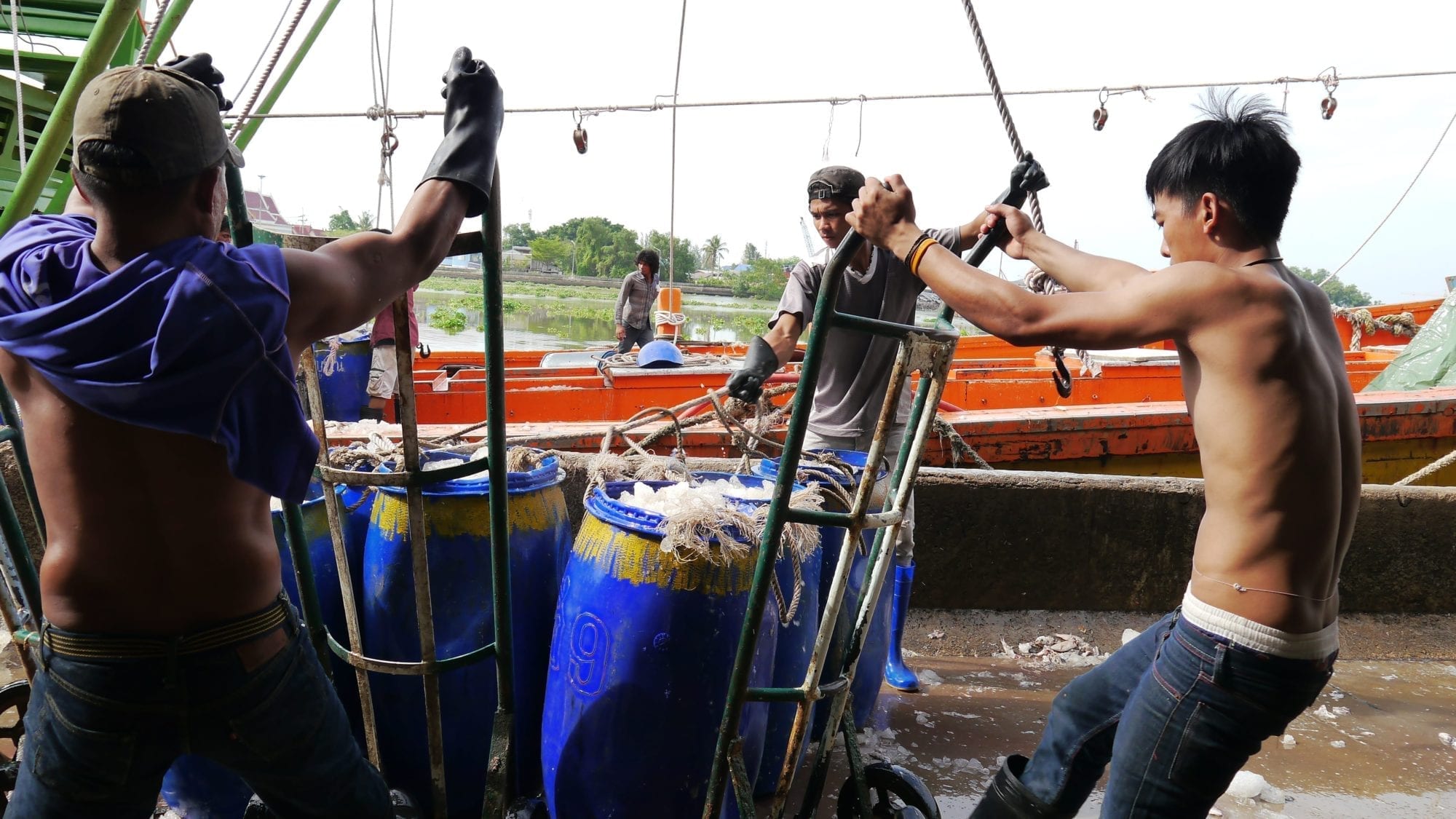
Dec 8, 2016
Many of the more than 150 million migrant workers around the world endure abusive conditions—and one of the most exploitative phases of transnational labor migration takes place before migrants even leave their home country: recruitment for work abroad.
Forced to take on debt to pay the exorbitant fees labor brokers charge to secure a job, migrant workers often cannot repay it even after working for years. Trapped in debt bondage, a situation further exacerbated when workers’ visas are tied to employers and employers confiscate workers’ passports, they have no means of escape when employers abuse them or withhold wages.
“Labor recruitment fees can lead to debt bondage and should be eliminated,” says Sonia Mistry, Solidarity Center senior program officer for Asia. Mistry is taking part this week in Civil Society Days, a series of panels and events by nongovernmental organizations leading up to the December 10–12 Global Forum on Migration and Development (GFMD) meeting. Participants in Civil Society Days will present recommendations to representatives of the more than 100 governments meeting at the annual GFMD conference.
GFMD events, taking place this year in Bangladesh, coincide with Human Rights Day December 10. Commemorated annually, Human Rights Day marks the date in 1948 when the United Nations General Assembly adopted the Universal Declaration of Human Rights, which includes the right to freedom of peaceful assembly and association.
‘Multinationals Must Hold suppliers Accountable for Forced Labor’
Mistry, who will speak Friday on the Civil Society Days panel, “Protecting and Empowering Migrant Workers in all Global Supply Chains,” says multinational corporations have not done enough to prove to consumers that their supply chains are not tainted with forced labor.
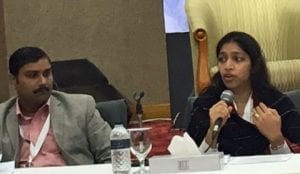
Solidarity Center’s Sonia Mistry outlined strategies for reforming exploitative migrant labor recruitment practices.
“Multinational corporations need to exert their significant power as buyers to hold suppliers accountable for supply chains free of forced labor,” she says. Companies argue that it is too difficult or expensive to completely map their supply chains.
The recruitment and placement industry is a $464.3 billion-a-year industry.
During the recruitment process, it is routine for recruiters and their agents to make false promises about the jobs on offer, charge would-be migrants fees that exceed their annual income and offer loans at usurious rates, demanding property deeds as collateral.
Mistry and co-panelist Anup Srivastava from the Building and Wood Workers International (BWI) say promoting the rights of migrant workers in supply chains requires a multifaceted approach that can be undertaken even in difficult environments—“so there is no space for ‘it’s too hard’ excuses by employers or governments,” Mistry says.
At the panel, Mistry will recommend:
- All workers have equal access to internationally recognized labor standards, regardless of where they are.
- Workers—who are the best workplace monitors—have the freedom of association rights they are due and are protected to raise and help address workplace safety, health, legal and rights violations. “At all points in the supply chain, unions serve as key partners in promoting decent work and addressing some of the most egregious rights violations, including child labor, forced labor and gender-based violence,” says Mistry. “No auditing system or third-party verification scheme can replace the role of unions.”
- Binding and enforceable agreements be struck to enforce and protect worker rights. These can take many forms, from an International Labor Organization (ILO) standard to a collective bargaining agreement.
Unions Call on GFMD to Take Action to Protect Migrant Worker Rights
Participants at the GFMD’s ninth meeting are considering how member states can design a “Global Compact” to govern the mobility of migrant workers and the possible commitments by stakeholders to create a comprehensive global framework and follow-up mechanism. The Solidarity Center, along with the Council of Global Unions (CGU) and the AFL-CIO, is calling for recognition in the Global Compact negotiations of the “vital role of the ILO, founded on a mandate of social, justice, peace and democracy.”
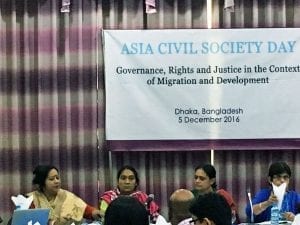
Participants from unions around the globe held discussions and events in preparation for the GFMD meeting. Credit: Solidarity Center/Sonia Mistry
As noted by the CGU, the “ILO has important standards related to labor migration and a robust system to supervise those instruments. It is also the institutional protector of other workers’ rights that also apply to migrant workers, such as trade union rights (including freedom of association and collective bargaining), forced labor (including trafficking) and child labor, occupational health and safety protection, social security and many others.”
Civil society groups are urging the GFMD to take action to protect migrant workers’ rights by fulfilling the portion of the UN’s 2030 Sustainable Development Goals (Goal 8) that calls for taking immediate measures to eradicate forced labor, end modern slavery and human trafficking, protect labor rights and promote safe and secure working environments for all workers, including migrant workers.
The GFMD is a non-binding and government-led process open to United Nations member states and observers “to advance understanding and cooperation on the mutually reinforcing relationship between migration and development and to foster practical and action-oriented outcomes.”
Unions and other civil society organizations have been advocating for a stronger role for civil society in the GFMD.



